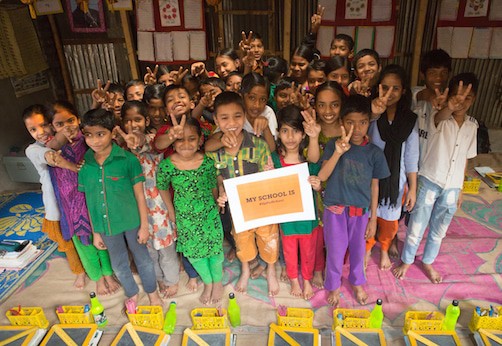Education is the birth right of every child, but today there are more than 120 million children who do not go to school.
When the United Nations member states came together back in 2000, they agreed upon 8 targets that would tackle extreme poverty and improve the experiences and outcomes of millions of people in doing so. The second of these Millennium Development Goals committed to achieving Universal Primary Education, ensuring that by 2015, children everywhere would be able to complete a full course of primary schooling.
It’s deadline year, and 58 million primary-aged children are still not in school. Many things can block a child’s pathway to education, but time and time again it’s the same old obstacles rearing their ugly heads.
Perhaps unsurprisingly, money is a major factor in keeping children out of education. Many governments around the world have abolished school fees, but as the international advocacy and campaigning organisation ONE points out, all too often this is not enough, with costs such as uniforms and exam fees still standing between children and their schools. Cycles of poverty and education are deeply linked, and if these cycles cannot be broken, the same problems will be faced by future generations again and again.
Of the children who don’t go to school, more than half live in countries affected by conflict. Since 2011, the education of 670 000 children in Syria has been disrupted. In 2014, 68 attacks on schools there were recorded, killing and wounding hundreds of pupils. Human Rights Watch state that in too many countries affected by conflict, consequences of attacking schools fall on the affected communities, and not the perpetrators, highlighting the need for focused, coordinated national and international action.
There are 33 million girls not at primary school owing to gender-specific barriers that stand in their way. Such barriers include cost, cultural norms that favour boys’ education and lack of sanitation facilities at schools. This inequality of education is unacceptable when it is the right of every child to go to school, but if basic rights aren’t persuasion enough, educating girls is a sound investment. Reduced prevalence of HIV, higher earning capacity and smaller, better-educated families are just some of the proven positive effects of educating girls.
Despite the 1994 Salamanca Agreement promising inclusive education for all, discrimination and lack of understanding surrounding disability and special educational needs still keeps thousands of children out of school. Nelson is 8 years old, and profoundly deaf. He lives with his mum Esther in Kampala, Uganda’s capital city. He attends a specialist deaf school, which means that before every term, his mum must scrape together the costly school fees along with money for a uniform and other requirements. This is a constant struggle, but Nelson’s mum is determined to provide him with an education that meets his needs. Sadly, there are hundreds more deaf children all over Uganda without the same opportunities who are marginalized and denied their right to go to school. This Channel Four Documentary provides a glimpse of some of the challenges faced by these children.
The problems, however, run deeper. In addition to the numerous children who are out of education, there are millions more who leave school without the most basic skills. UNICEF estimate that 130 million children do not learn to read and write despite reaching grade 4. This has been dubbed a ‘crisis in learning’, and demonstrates the need to focus on quality of education as well as quantity of children receiving it. This UNICEF Video provides a useful overview of the educational landscape as it stands.
So what can you do?
Sign the #UpForSchool petition! Launched by A World At School, the petition is putting pressure on governments to remove barriers to educational access and honour the commitments made by the millennium development goals. Already, more than 3 million people from all over the world have signed, so add your voice and up the pressure today.
But don’t forget, educational inequality is a problem here too! As a student, you can make a valuable contribution by volunteering at one of the many projects that exist all over the UK. Find out what’s going on through your university Hub.
Sign the #UpForSchool petition to put pressure on governments to remove barriers to educational access.

